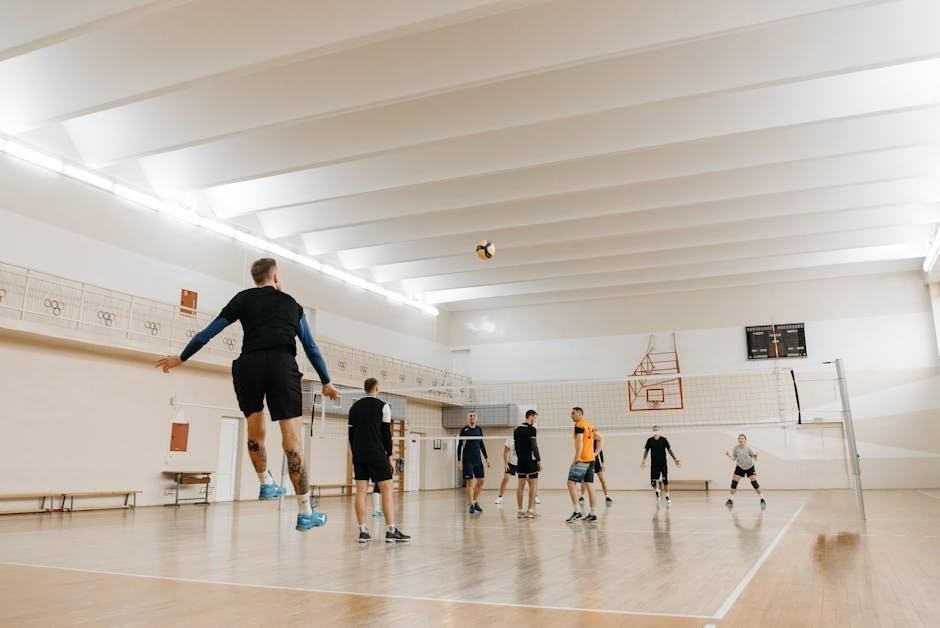The PE Civil Transportation exam is a critical step for engineers seeking licensure‚ assessing expertise in traffic engineering‚ roadway design‚ and transportation planning․ Utilizing resources like the NCEES practice exam PDF and study guides ensures comprehensive preparation․
Overview of the Exam
The PE Civil Transportation exam is a computer-based test administered by NCEES‚ featuring 80 questions and a 9-hour duration․ It includes multiple-choice questions and alternative item types like fill-in-the-blank and drag-and-drop․ The exam assesses knowledge in traffic engineering‚ geometric design‚ and transportation planning․ NCEES provides an electronic reference handbook and design standards during the exam‚ which are the only allowable resources․ This format ensures a comprehensive evaluation of engineering competency in the transportation discipline․
Importance of Practice Exams in Preparation
Practice exams are essential for familiarizing candidates with the PE Civil Transportation exam format‚ content‚ and timing․ They simulate real test conditions‚ helping candidates assess their readiness and identify knowledge gaps․ Official practice exams‚ such as the NCEES PE Civil Transportation exam PDF‚ mirror the actual test‚ including alternative question types like fill-in-the-blank and drag-and-drop․ Regular practice builds problem-solving speed‚ reduces exam anxiety‚ and ensures candidates are well-prepared for the challenges of the actual exam․

Exam Format and Structure
The PE Civil Transportation exam is computer-based‚ featuring 80 questions with a 9-hour duration․ It includes multiple-choice and alternative item types‚ such as fill-in-the-blank and drag-and-drop questions․
Computer-Based Testing (CBT) Details
The PE Civil Transportation exam is administered via computer-based testing at Pearson VUE centers․ It includes 80 questions‚ with a 9-hour exam window․ The format features multiple-choice and alternative item types‚ such as drag-and-drop and fill-in-the-blank questions․ NCEES provides an electronic reference handbook and searchable design standards during the exam․ No personal materials are allowed‚ ensuring a standardized testing environment for all candidates․
Types of Questions and Exam Duration
The PE Civil Transportation exam features 80 questions‚ including multiple-choice and alternative item types like drag-and-drop and fill-in-the-blank․ The exam lasts 9 hours‚ allowing candidates to manage their time effectively․ The variety of question types ensures a comprehensive assessment of engineering skills and knowledge‚ reflecting real-world transportation challenges and design standards․

Available Resources for Preparation
Key resources include the NCEES official practice exam PDF‚ study guides‚ online courses‚ and flashcards․ These tools provide comprehensive preparation for the PE Civil Transportation exam․
NCEES Official Practice Exam
The NCEES official practice exam for the PE Civil Transportation is a must-have resource‚ featuring 80 questions that mirror the actual exam format and content․ Designed to simulate the computer-based testing experience‚ it includes multiple-choice questions and alternative item types like fill-in-the-blank and drag-and-drop․ The practice exam is available in PDF format and provides detailed solutions to help candidates understand their strengths and areas needing improvement․ It is specifically tailored to the Transportation depth section‚ ensuring focused preparation for key topics such as traffic engineering‚ geometric design‚ and transportation planning․ By using this resource‚ candidates can familiarize themselves with the exam structure and content‚ making it an essential tool for effective preparation․
Study Guides and Reference Materials
Comprehensive study guides and reference materials are essential for preparing for the PE Civil Transportation exam․ The PE Civil Review Manual offers detailed coverage of exam topics‚ while the Transportation Depth Six-Minute Problems book provides over 100 practice questions․ Additional resources include the NCEES handbook and design standards‚ which are searchable PDFs for easy navigation․ Structured review courses and online tutorials further enhance preparation‚ ensuring a thorough understanding of key concepts and exam standards․
Online Courses and Platforms
Online courses and platforms offer structured learning experiences‚ such as the School of PE’s review courses‚ which provide video lessons‚ practice problems‚ and interactive tools․ Platforms like PPI and Civil Engineering Academy offer customizable study plans‚ live webinars‚ and discussion forums․ These resources simulate exam conditions‚ helping candidates familiarize themselves with the format and improve time management․ They also include access to digital simulations and practice exams‚ enhancing overall exam readiness․
Key Topics Covered in the Exam
The PE Civil Transportation exam covers traffic engineering‚ geometric design‚ transportation planning‚ and drainage and pavement design․ These key topics are central to the examination․
Traffic Engineering Fundamentals
Traffic engineering fundamentals are a core component of the PE Civil Transportation exam‚ focusing on traffic flow theory‚ capacity analysis‚ and traffic signal design․ Candidates are tested on their ability to analyze and design traffic systems‚ ensuring safety and efficiency․ Practice exams often include problems related to traffic volume‚ signal timing‚ and intersection design‚ mirroring real-world scenarios․ These questions assess the application of theoretical knowledge to practical transportation challenges‚ making them critical for exam preparation and professional competence․
Geometric Design of Roadways
Geometric design of roadways involves creating safe and efficient transportation infrastructure‚ focusing on horizontal and vertical alignments‚ cross-section design‚ and intersection layout․ Practice exams often include questions on design speed‚ radius of curvature‚ and clearance requirements․ These problems emphasize adherence to AASHTO guidelines and the ability to apply geometric principles to real-world scenarios‚ ensuring candidate proficiency in designing functional and safe roadways for various traffic conditions․
Transportation Planning and Policy
Transportation planning and policy focus on developing strategies for efficient transportation systems‚ balancing mobility needs‚ environmental impact‚ and public policy․ Practice exams often include questions on long-range planning‚ travel demand forecasting‚ and compliance with federal regulations․ These topics require understanding of transportation policies and the ability to apply them to real-world scenarios‚ ensuring candidates can develop sustainable and equitable transportation solutions aligned with current standards and practices․
Drainage and Pavement Design
Drainage and pavement design are critical components of the PE Civil Transportation exam‚ focusing on hydrological analysis and stormwater management systems․ Practice exams often include questions on pavement material selection‚ structural design‚ and maintenance considerations․ Key topics include calculating runoff coefficients‚ designing culverts‚ and ensuring compliance with drainage standards․ Pavement design involves understanding Equivalent Single Axle Load (ESAL) and mechanistic-empirical methods to ensure long-term road performance and safety․

Effective Preparation Strategies
Utilize practice exams‚ create structured study schedules‚ and leverage flashcards to master key concepts․ Joining study groups enhances collaborative learning and problem-solving skills‚ ensuring exam readiness․
Creating a Study Schedule
Developing a structured study schedule is essential for effective preparation․ Allocate specific time for practice exams‚ topic reviews‚ and mistake analysis․ Use resources like the NCEES handbook and design standards to guide your plan․ Incorporate online courses and flashcards to reinforce key concepts․ Consistency and time management are crucial to covering all exam topics thoroughly․ A well-organized schedule ensures steady progress and boosts confidence for the exam day․
Utilizing Flashcards for Key Concepts
Flashcards are a valuable tool for memorizing key concepts and formulas in transportation engineering․ Create or use pre-made flashcards focusing on traffic flow‚ geometric design‚ and pavement materials․ Review them regularly to reinforce memory retention․ Digital flashcard platforms offer interactive features‚ making study sessions more engaging․ Pair flashcards with practice exams to apply concepts in real exam scenarios‚ ensuring a well-rounded preparation strategy for the PE Civil Transportation exam․
Joining Study Groups or Forums
Engaging with study groups or forums connects you with fellow exam candidates‚ fostering collaborative learning and shared resources․ Discuss challenging topics‚ exchange study materials‚ and gain insights from others’ experiences․ Platforms like NCEES forums or Reddit communities provide valuable discussions and tips․ Active participation can clarify doubts and enhance understanding of key concepts‚ making your preparation more efficient and targeted for the PE Civil Transportation exam․
Practice Exams and Simulations
Practice exams and simulations are essential for familiarizing yourself with the exam format․ The NCEES PE Civil Transportation practice exam includes 80 questions and solutions‚ mirroring the actual test experience․
Benefits of Taking Full-Length Practice Exams
Taking full-length practice exams for the PE Civil Transportation exam is crucial for assessing time management and problem-solving skills․ These exams simulate real test conditions‚ helping candidates identify weaknesses and improve accuracy․ The NCEES practice exam PDF includes 80 questions with solutions‚ allowing detailed review and understanding of mistakes․ Regular practice builds confidence‚ reduces exam-day anxiety‚ and enhances familiarity with the exam format and question types․
Reviewing and Learning from Mistakes
Reviewing mistakes from practice exams is vital for improving performance on the PE Civil Transportation exam․ Analyze incorrect answers to understand error patterns and gaps in knowledge․ Focus on understanding the correct solutions and reinforcing weak areas․ Use flashcards to revisit difficult concepts and track progress systematically․ Regular review ensures lessons are learned and applied effectively‚ maximizing exam readiness and confidence․

Reference Materials and Design Standards
Essential resources include the NCEES handbook‚ AASHTO‚ and MUTCD standards․ Practice exam PDFs and design guides provide detailed examples‚ ensuring familiarity with exam-specific materials and codes․
Using the NCEES Handbook
The NCEES handbook is a vital resource for the PE Civil Transportation exam‚ providing essential equations‚ formulas‚ and design standards․ It is searchable and includes linked chapters for easy navigation․ Candidates can access it during the exam‚ making it crucial for familiarizing oneself with its content․ The handbook complements practice exams by aiding in problem-solving and understanding theoretical concepts․ Regular review enhances preparation and reduces exam-day anxiety․
Important Design Standards and Codes
Key design standards for the PE Civil Transportation exam include AASHTO‚ MUTCD‚ and HCM․ These codes provide guidelines for roadway design‚ traffic control‚ and highway capacity analysis․ Familiarity with these standards is crucial‚ as they are frequently referenced in exam questions․ The NCEES handbook and practice exams often incorporate these standards‚ ensuring candidates understand their practical application in real-world engineering scenarios․

Recommended Courses and Tutorials
Structured review courses and online platforms offer comprehensive materials‚ including practice exams and interactive tools‚ to aid in preparing for the PE Civil Transportation exam effectively․
Structured Review Courses
Structured review courses provide a comprehensive approach to exam preparation‚ offering detailed study materials‚ practice exams‚ and guided instruction․ Many courses include access to eBooks‚ lecture notes‚ and interactive tools to enhance learning․ The School of PE and Civil Engineering Academy are popular choices‚ offering courses tailored to the PE Civil Transportation exam․ These courses often include timed practice exams‚ step-by-step solutions‚ and focused study plans to ensure thorough preparation for the exam․
Online Tutorials and Webinars
Online tutorials and webinars offer flexible learning opportunities for PE Civil Transportation exam preparation․ Platforms like the School of PE and Civil Engineering Academy provide on-demand courses with detailed handouts and practice problems․ These resources cover exam-specific topics‚ such as traffic engineering and roadway design‚ with step-by-step solutions․ Webinars also provide insights into exam strategies and design standards‚ helping candidates stay updated and well-prepared for the exam․
Flashcards and Quick Reference Guides
Flashcards and quick reference guides are invaluable for PE Civil Transportation exam prep‚ offering concise reviews of key terms and concepts․ Utilize flashcards for targeted study sessions and quick reference guides like the NCEES handbook for essential design standards and formulas‚ ensuring efficient exam preparation and success․
Effective Use of Flashcards
Flashcards are a valuable tool for PE Civil Transportation exam preparation‚ helping candidates master key concepts and formulas․ By focusing on high-yield topics like traffic engineering and geometric design‚ flashcards enable active recall and spaced repetition․ Digital flashcards‚ such as those available for the Civil Transportation exam‚ offer portability and accessibility‚ allowing candidates to study efficiently․ Pairing flashcards with practice exams enhances understanding and retention of critical exam content․
Creating Personalized Study Aids
Creating personalized study aids‚ such as custom flashcards or summary sheets‚ tailors your preparation to your strengths and weaknesses․ Focus on high-yield topics from the PE Civil Transportation exam‚ like traffic engineering and geometric design․ Digital tools allow you to organize and review material efficiently․ By integrating these aids with practice exams‚ you can reinforce learning and improve retention‚ ensuring a focused and effective study routine․
Case Studies and Real-World Applications
Analyzing project case studies allows engineers to apply theoretical knowledge to real-world scenarios‚ enhancing problem-solving skills and exam readiness․
Analyzing Project Case Studies
Analyzing project case studies from resources like the NCEES practice exam PDF helps engineers apply theoretical knowledge to real-world scenarios‚ enhancing problem-solving skills and exam readiness․
Applying Theoretical Knowledge Practically
Applying theoretical knowledge practically is crucial for success in the PE Civil Transportation exam․ Resources like the NCEES practice exam PDF provide real-world scenarios‚ enabling engineers to solve problems in traffic flow‚ geometric design‚ and pavement analysis․ By bridging theory and practice‚ these materials enhance problem-solving skills and prepare examinees for the challenges of both the exam and actual engineering projects․
Common Challenges and Solutions
One common challenge is mastering complex question types․ Utilizing practice exams‚ like the NCEES PE Civil Transportation PDF‚ helps familiarize candidates with exam formats and content․
Time Management During the Exam
Effective time management is crucial for the 9-hour PE Civil Transportation exam‚ which includes 80 questions․ Allocate 6-7 minutes per question‚ leaving time for review․ Practice exams‚ like the NCEES PE Civil Transportation PDF‚ help improve pacing and reduce exam-day anxiety․ Focus on balancing speed with accuracy‚ especially for complex alternative item types․ Regular practice ensures familiarity with the format‚ enabling better decision-making under time constraints․
Overcoming Difficult Question Types
Mastering challenging question types‚ such as alternative item formats‚ requires targeted practice with resources like the NCEES PE Civil Transportation practice exam PDF․ Skim through questions to allocate time wisely‚ focusing on high-confidence answers first․ Use elimination techniques to narrow down options and minimize guesswork․ Regular exposure to diverse question formats through practice exams builds familiarity and confidence‚ ensuring readiness for the exam’s varied and complex content․
Success Stories and Tips from Professionals
Professionals who passed the PE Civil Transportation exam emphasize the importance of consistent practice with NCEES practice exam PDFs and creating a structured study plan․
Interviews with Recent Exam Takers
Recent exam takers highlight the importance of utilizing the NCEES PE Civil Transportation practice exam PDF for realistic question exposure․ Many emphasize mastering alternative item types and time management․ They recommend dedicating ample time to understanding design standards and referencing the handbook during practice․ Consistent review of mistakes and focused study on weak areas were key strategies․ Leveraging online forums and study groups also played a significant role in their success․
Proven Strategies for Success
Success in the PE Civil Transportation exam often stems from structured preparation․ Candidates recommend starting with a comprehensive study schedule‚ focusing on weak areas identified through practice exams․ Regular use of flashcards for key formulas and concepts is highly advised․ Additionally‚ solving full-length practice exams under timed conditions helps build exam stamina and familiarity with the question format․ Reviewing mistakes and understanding the rationale behind each answer is crucial for improvement․

Stay Updated with Exam Changes
Regularly check the NCEES website and subscribe to their newsletter for updates on exam specifications and design standards․ Follow their YouTube channel for the latest information․
Latest Exam Specifications
The NCEES updates exam specifications every 6 months‚ ensuring alignment with industry standards․ As of April 1‚ 2024‚ the PE Civil Transportation exam includes 80 questions‚ with a 9-hour testing window․ The exam features multiple-choice questions and alternative item types (AITs)․ Design standards are updated more frequently and are available electronically․ Candidates must refer to the official NCEES handbook and design standards during the exam‚ as no personal materials are allowed․
Updates in Design Standards
The design standards for the PE Civil Transportation exam are updated regularly‚ with the latest changes effective April 1‚ 2024․ These updates reflect current engineering practices and are available electronically through the NCEES portal․ Candidates must familiarize themselves with these revised standards‚ as they are integral to solving exam problems․ The standards are provided as searchable PDFs‚ enhancing navigation during the test․
Mastering the PE Civil Transportation exam requires dedication and strategic preparation․ Utilize official practice exams‚ study guides‚ and online resources to build confidence․ Stay updated on design standards and exam specifications․ Create a structured study schedule and practice under timed conditions․ Review mistakes to improve understanding․ Join study groups for collaborative learning and seek professional insights․ Stay focused‚ manage time effectively‚ and trust your preparation for success․
